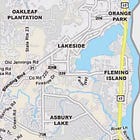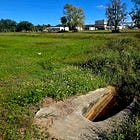The Latest from the Department of Bad Ideas (Part Two)
No Good, Very Bad Examples of Incorporation: Green Cove and Orange Park
The spending habits of both municipalities are unsustainable.
My sweet Mama used to say “You learn more from seeing what happens when people do stupid stuff, than you do when somebody just tells you not to do it.”
Yesterday I wrote that some folks are talking about incorporating Fleming Island, Lake Asbury and Oakleaf and I told why it shouldn’t be done. Now, I’ll share my mother’s advice and give you a cautionary tale of two cities and what happened when they incorporated.
Historical data and research shows that small municipalities with a population of under 25,000 are never financially successful. The Town of Orange Park has a population of 9,047, and the population of the City of Green Cove Springs is 10,130.
Upon incorporation, a town’s residents still have to pay county and state taxes, in addition to the new municipal taxes, which have to be astronomical to cover the substantial costs of maintaining infrastructure, salaries and services. As a result, middle and lower income homeowners are taxed out of their homes, only to be replaced by wealthier newcomers who inherit overpriced tax bills.
This is happening in both Green Cove and Orange Park. Residents have attended council meetings and literally begged council members not to raise taxes, saying they are already choosing between paying taxes and buying medication and food. Sadly, the taxes are typically raised.
Both municipalities, are chartered as “Weak Council” forms of government; like what is apparently being proposed in Fleming Island, Lake Asbury and Oakleaf. This means the mayor is not elected. Council members take turns as mayor—unless one’s nap regularly overlaps with a council meeting or they star in a scandal too juicy to ignore and they lack a powerful pal to convince the rest of the council to turn over the gavel.
A chorus of voices from longtime residents to former mayors, former council members and city staffers said the spending habits of both municipalities are unsustainable and are undermining long-term financial stability.
Nevertheless, here in Florida the state does not get involved in a municipality’s business unless they’ve had issues such as election fraud, capital offenses like murder, capital sexual battery, or voter/election fraud. The state assumes voters select council members to guard their best interests. Yet, in weak governments, citizens get a few minutes to speak at council meetings and council members get to ignore them—apparently taking cues from Clay’s School Board.
With the weak charter, the town council votes on the budgets, then all rights and responsibilities are typically left up to the manager of the municipality. The Orange Park and Green Cove managers are two of the highest paid in the entire state, nearing $200,000 each in payroll and benefits.
Despite the large salary, it took Orange Park nearly a year and cost them a boatload of money searching for a town manager—only to cycle through one with a scandalous résumé, a buddy hire with zero experience, and finally land on someone from Iowa who will start on December 1. All this unfolded while the town’s own finance director—who’d applied for the job and was reportedly judiciously keeping things afloat during the town’s long search—was quietly overlooked.
Clay News & Views reviewed the town’s Capital Improvement Plan (CIP). It shows the town is trying to borrow $14 million and hoping to receive a non-guaranteed matched grant of $7 million.
The CIP states this money is for “Culvert improvements for the Nelson Drive Area.” However, sources inside the town say the money is to raise several major streets, including Plainfield, which are arteries in the town, so they can build a navigable “kayak trail” or water path under the effected streets for the new Rob Bradley Park, previously called Nelson Park.
The town has already spent enormous funds for a parking lot on the property which destroyed wetland habitats and caused additional flooding to the already flood prone area. Engineers argue raising the streets will cause more major flooding in the town and will cost much more than the town has anticipated. If the town gets the grant, it won’t be awarded until all money has been borrowed and the project is totally completed.
Employees say the funds will also include a ladder truck for their fire and rescue department, which should have been included in the CIP. The CIP also shows the town plans to spend $35,000 to repair its fountain.
The town spans about 3.7 square miles of land, and with no room left for annexation, so they are exploring new ways to grow their tax base. One proposal under consideration is to revise longstanding zoning rules that limit buildings to three stories. By allowing taller, multi-story developments, the town hopes to attract more businesses and residents, boosting revenues without expanding its borders.
Orange Park’s annual budget is $40.3 million. High property and user taxes, red light camera fines, and steep water rates generating over $1 million a year—help keep the town’s debt at zero.
Residents hope the town can remain in the black as Orange Park is mentioned, along with the City of Jacksonville, in a YouTube video titled Top 10 Florida Cities Where The Real Estate Market Will Collapse in 2025.
Green Cove appears to have fallen even farther behind than Orange Park in the commonsense department. Their budget is $61 million and they have racked up $45 million in debt.
Green Cove Springs Electric services the city and unincorporated areas in southern Clay County. Of all the municipally owned utilities in the state, Green Cove has the highest rates. In 2022, the electric company, infamous for its blackouts, overcharged ratepayers by $2 million.
Leaving customers, council members and employees in the dark, both literally and figuratively, employees said the utility did not offer a refund or reduce customer’s bills. Instead, they gave the cash-strapped city $1.245 million dollars.
When the overpayment was discovered, employees said the electric company insisted it was a loan, but there were no loan documents. The utility then gifted the city $500,000 of the $1.245 million, but there are still no plans or documents for the repayment.
While state auditors recommend reserves in all accounts, insiders say the town is not even close. Sources say the “Emergency Reserve Fund,” which should be set aside in case of a weather event, fire or other types of emergencies, is typically dry as a Baptist picnic. Since April, the emergency fund is $6 million in the red, with no significant improvements to justify the deficits.
Mike Kelter, a former mayor, council member, and presently city watchdog, has charted the glacial rise in the taxes for the City of Green Cove Springs in the last five years. Property taxes have risen 43 percent, electric rates 60 percent, and water rate 20 percent with a proposal to now raise water rates another 12 percent. In addition to the highest electrical rates in the state, Kelter said Green Cove also has the largest wastewater rates in Northeast Florida.
“This year, despite bringing in an extra $1.4 million, the town is still struggling to tuck aways just $300,000 for emergencies,” Kelter said. “They act like saving is some kind of advance calculus.”
The city received almost $4 million dollars in COVID relief funds. Instead of boosting reserves or paying off debt, they funneled most of it into “beautifying” Walnut Street—for the third time.
Sources say Green Cove Springs plans to recoup misspent funds by increasing red light cameras, which they tout as reducing accidents and injuries. However, Florida Department of Transportation data shows the camera’s actually cause more accidents.
They also plan to levy higher stormwater fees—a fee on rainwater flowing into city drains. But the stormwater fees seem inconsistent: some residents pay $40 a month, others just $3. City Manager Steve Kennedy can waive or reduce fees, but his decisions appear erratic.
He forgave charges for the massive Reynolds Industrial Park and the Clay County School Board, which simply refused to pay. Magnolia Point residents were excused due to their private drainage system. Yet Ward Huntley, who has property on Hwy. 16 and his own drainage system, was billed $94,600. Unsure of the legality, the city told Huntley to pay or sue. He chose to sue.
Recently, Kelter said Green Cove’s garbage truck broke down and the city has been struggling to come up with a $50,000 down payment to replace it. Residents told CN&V they believe poor maintenance was the culprit since the truck only had 70,000 miles on it. Locals said it appeared the truck had never been washed out so maggots had taken over.
“On garbage day, we stay inside or leave for work early,” said one resident. “because everybody close or down range from the trucks starts gaging.”
It appears the present Green Cove council may be taking more of an interest in the goings-on of the city. Kennedy had previously told council members he thought it best for them not to interact with citizens. At the last council meeting, it appeared Kennedy may have misinformed some members about issues. He abruptly resigned as City Manager effective in November. The city’s finance director also resigned on Oct. 23.
I would be remiss if I did not mention that there are wonderful residents, along with present and former council members, that care deeply about the rising costs of living and the success of their town, but it appears their options are limited.
The financial problems run even deeper than what’s been reported here. Meanwhile, residents of Fleming Island, Lake Asbury, and Oakleaf might want to cue up Dire Straits—because if incorporation moves forward, they’ll be handing over money for nothing and getting bureaucratic headaches for free.





